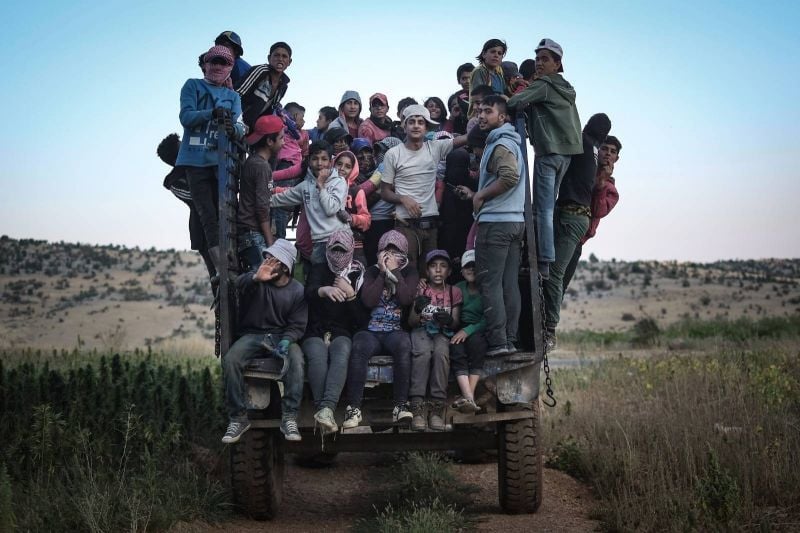
More than a million Syrians have fled their country’s conflict only to find themselves caught in Lebanon’s collapse. (Credit: João Sousa/L’Orient Today)
Lebanon has collapsed. A pandemic, a “nuclear-like” explosion that has destroyed a third of the capital, and an unprecedented economic collapse mean that more than half of the country’s population are now trapped in poverty. The percentage of resident families living in extreme poverty has tripled since 2018 to reach 23 percent in 2020.
Well before the crises of recent years, the government of Lebanon had actively impeded the provision of support to vulnerable populations within the country. Residents are facing challenges on a scale never before imagined — profound deprivation, the deterioration of the protection environment, and few opportunities for a better life.
This dreadful situation is even worse for the 1.5 million Syrians who have fled conflict — a figure that has remained more or less stable despite the few departures recorded and the fact that 865,500 Syrian refugees are currently registered with the United Nations. They have left their homeland only to be trapped in another collapsing country, the crises have only compounded their already difficult existence, and the Lebanese government is even less incentivized to care for these non-citizens.
Now pause and imagine you are faced with this reality — you belong to the 89 percent of Syrian refugees living in extreme poverty.
Ten years after your home country was engulfed in a violent conflict that forced you and your loved ones to flee, you feel there is no way out. If you had managed to secure a job in Lebanon, you, along with your Lebanese neighbors, have probably lost it. You cannot make ends meet. You struggle to survive and keep your family afloat. You are trapped in a makeshift tent that you and your family have been calling home since you sought refuge in Lebanon.
Today, you wake up and have a decision to make. Should you leave what has become like a prison to look for a job? If you decide to go out, do you risk contracting the virus that has swept the globe? If you decide to stay, will you have enough bread to feed your children tonight? What about tomorrow?
You may not need to struggle with this dilemma, since the authorities might not even allow you to go out due to the COVID-19 prevention measures. Today, more than ever, prevention measures are important to stop the spread of the pandemic. But the very same system that imposes those measures and requires you to stay inside for the safety of the community offers zero alternatives to mitigate the complete deprivation that comes with forced isolation. They say it is in your best interest not to leave your tent; however, they fail to reassure you that bread will be brought to you and your children tonight.
Your movement outside the settlement where you live has always been a risk, because you do not possess a valid residency permit, as is the case for 80 percent of the Syrian refugee population in Lebanon. Not having legal residency has meant that over the past few years, every time you went out you risked being arrested at checkpoints and potentially deported. Today, the risk is even greater. If you decide to go out, the chances that you will find a job are scarce. If you manage to work for a few hours, not get arrested for being undocumented, and not get fined for flouting the COVID-19 measures, you might get to the grocer and still not have enough money to buy food for your family to spare you repeating this scenario over the coming few days.
On top of everything, if you contract COVID-19 during this journey and you end up in need of hospitalization, or if your children need care while you are sick, or they themselves contract the virus, then you are without doubt doomed.
Before you sleep, you contemplate the faces of your loved ones and hope that things will change. But after 10 years of hardship upon hardship, hope has become a fleeting resource.
Pause and imagine this reality — a mere glimpse of life for the estimated 1.5 million Syrian refugees in Lebanon. What words would you have left to tell the world what is happening, how you feel and what course of action you should take? And if you had the words, would they even listen?
All indicators from the past decade point to a resounding no. For 10 years, the narrative has remained the same — international stakeholders, governments and donors condemn the violence in Syria and call for solidarity with those struggling to survive both inside and outside the country. As we saw again in Brussels last week, they come together in foreign capitals to pledge funding and support for short-term assistance. Yet life on the ground for the refugees does not change. In fact, it continues to deteriorate. This year, the donors’ pledges decreased by 23 percent, host governments and donor governments continue to refuse to take sufficient steps to provide for durable solutions, Syria remains unsafe for returns, and the voices and perspectives of the refugees themselves remain marginalized and overlooked.
In Lebanon, the need for political and economic reform is urgent and essential for any hope of improving the life of the Lebanese as well as Syrian refugees. However, wealthy governments should also scale up resettlement programs, providing Syrians with the opportunity to seek asylum and find safety in third countries. But until we witness a commitment to change beyond the fading calls for solidarity and support made year after year, hope among refugees for a better life remains scarce.
Nour Shawaf is the humanitarian program coordinator for Oxfam in Lebanon.